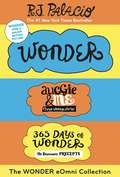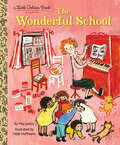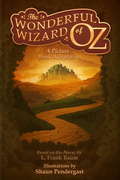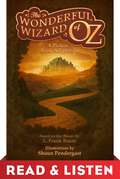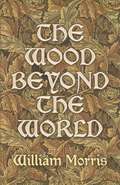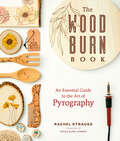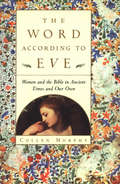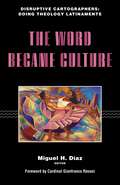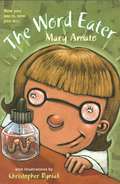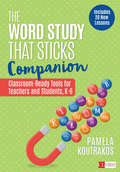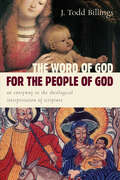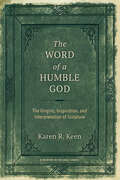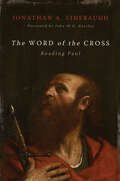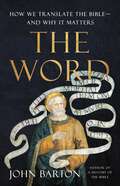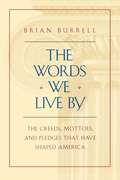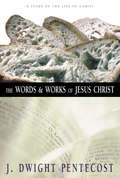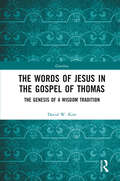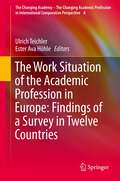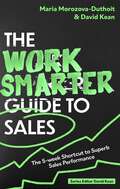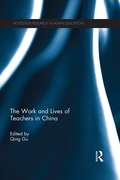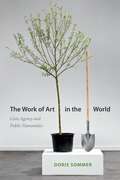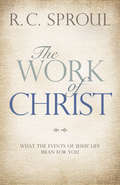- Table View
- List View
The Wonder eOmni Collection: Wonder, Auggie & Me, 365 Days of Wonder
by R. J. PalacioWONDER IS NOW A MAJOR MOTION PICTURE STARRING JULIA ROBERTS, OWEN WILSON, AND JACOB TREMBLAY! Over 6 million people have read the #1 New York Times bestseller Wonder—the book that inspired the Choose Kind movement—and have fallen in love with Auggie Pullman, an ordinary boy with an extraordinary face.The internationally beloved novel Wonder, the treasured collection of companion stories Auggie & Me, and the inspirational 365 Days of Wonder: Mr. Browne's Book of Precepts are now available in an ebook omnibus edition. This is the perfect package for the millions of readers who have fallen in love with Auggie Pullman, his friends, and their teacher Mr. Browne, and also for readers who have yet to be introduced to the wonder of Wonder.
The Wonderful School (Little Golden Book)
by May JustusA sweet rhyming story from 1971 about a beloved schoolteacher is back in print!There once was a very unusual schoolThat had for its teacher Miss Tillie O'Toole . . .So begins a rollicking story about a beloved teacher who presents all her lessons in riddles and rhyme, takes her students outside for picnics and kite-flying, and teaches them good, old-fashioned common sense along with the three R's. Charming illustrations of red-haired Miss Tillie O'Toole and her multicultural class make this breezy Little Golden Book as much fun to look at as well as read aloud!
The Wonderful Wizard of Oz, A Picture Book Adaptation
by L. Frank BaumA striking picture book adaptation for ages 6 up of L. Frank Baum's classic children's novel The Wonderful Wizard of Oz, about the magical journey of Dorothy Gale, her dog, Toto, and her faithful friends to the Emerald City. No child's library is complete without this enchanting fantasy with its enduring themes of loyalty, resourcefulness, courage, and unforgettable characters, such as the Scarecrow, the Tin Man, the Cowardly Lion, and the Wicked Witch of the West. First published in the year 1900, the complete novel is one of the best-known original fairy tales in American popular culture.
The Wonderful Wizard of Oz, A Picture Book Adaptation: Read & Listen Edition
by L. Frank BaumA striking picture book adaptation with Read & Listen audio narration for ages 6 and up of L. Frank Baum&’s classic children&’s novel The Wonderful Wizard of Oz—the story about the magical journey of Dorothy Gale, her dog, Toto, and her faithful friends to the Emerald City. No child&’s library is complete without this enchanting fantasy with its enduring themes of loyalty, resourcefulness, courage, and unforgettable characters, such as the Scarecrow, the Tin Man, the Cowardly Lion, and the Wicked Witch of the West. First published in the year 1900, the complete novel is one of the best-known original fairy tales in American popular culture. Shaun Pendergast&’s bold, graphic illustrations offer a fresh take on the Land of Oz. An illustrator and designer of unique applications for mobile and tablet devices, Shaun grew up in the San Francisco Bay Area, and now lives in Austin, Texas. Visit him at shaunpendy.com.This ebook contains Read & Listen audio narration.
The Wood Beyond the World
by William MorrisThe name Kelmscott bears a legendary and magical sound among bibliophiles. When William Morris founded the Kelmscott Press in 1890, he combined his medieval craft ideals with his skills as one of Britain's most sophisticated, progressive designers. He achieved his goal — the creation of books as beautiful as those of the Middle Ages — by abandoning many of the commercial practices of his day. Morris designed types of great elegance and reintroduced color into the body of the page, adding life to the printed word.Even if there were enough copies for everyone who wanted one, the cost of original Kelmscott books is prohibitively expensive. For this reason, Dover Publications has reissued one of Morris's most noteworthy books in a photographic facsimile that retains the enchantment of the original edition. More than an exquisitely produced book, The Wood Beyond the World ranks among the finest of Morris's prose-romances, a wonderful fantasy in a medieval setting, brimming with high adventure and flights of fancy. This superbly illustrated novel was among the first to combine reality and the supernatural, and it served as inspiration for J. R. R. Tolkien, C. S. Lewis, and countless other fantasists.
The Wood Burn Book: An Essential Guide to the Art of Pyrography
by Rachel StraussLearn the art of wood burning from a master of the craft in this comprehensive guide to the tools and techniques of “writing with fire.”The Wood Burn Book opens with a brief background to the art of wood burning, an overview of tools and materials, basic techniques, and safety tips. You will also find a detailed explanation of the process from start to finish, with patterns, advanced techniques for lettering and adding color, as well as dozens of projects, including picture frames, cutting boards, coasters, cards, wooden spoons, and jewelry.
The Word According to Eve: Women and the Bible in Ancient Times and Our Own
by Cullen Murphy“A disarming, intelligent, and timely book” that re-examines religious history and scripture with a focus on the feminine experience (The New York Times). In the world that created the Bible, there were no female scholars and theologians, yet in recent decades, owing to such stunning discoveries as the Dead Sea Scrolls and the Nag Hammadi texts, as well as advances in historical understanding and the rise of feminism, a generation of scholars has found new ways to interpret the Scriptures and the societies that created them—exploring avenues traditionally ignored by male-dominated religious study.Surveying the new scholarship and the personalities of those who have created it, The Word According to Eve not only explores afresh the history of our religions but offers exciting new challenges to our sense of worship.“Provocative and lucid . . . an engaging book.” —The Boston Globe
The Word Became Culture (Disruptive Cartographers: Doing Theology Latinamente)
by Miguel H. DíazExploring Latin@ theologies and the power of revelation.The Word Became Culture enacts a preferential option for culture, retrieving experiences and expressions from across latinidad as sources of theologizing and acts of resistance to marginalization. Each author in this edited volume demonstrates the many ways in which Latin@ theologies are disruptive, generative, and creative spaces rooted in the richness, struggles, texts, and rituals found at the intersections of faith and culture. With a foreword by Cardinal Gianfranco Ravasi, president emeritus of the Pontifical Council for Culture, this book situates Latin@ theologies in the ongoing search for and recognition of the “Word becoming” within the particularities of diverse cultural experiences.
The Word Eater
by Mary AmatoLife is miserable for sixth grader Lerner Chanse at her new school, where the MPOOE (Most Powerful Ones on Earth) Club ruthlessly rules over the SLUGs (Sorry Losers Under Ground). It looks like Lerner is destined to be a SLUG, until she finds a magical worm that eats printed words instead of dirt. If Fip eats a word, that item simply disappears from the world-forever. Now that Lerner knows about Fip's magic, she has some big decisions to make. Should she eliminate crime? Or simply wipe her school off the face of the earth? Or will destroying anything cause effects that she can't imagine or predict? Lerner discovers that extraordinary power brings extraordinary responsibility...but will she learn her lesson too late? This is a story about making friends, being grounded, feeling left out, being ganged up on and blamed unfairly, getting sent to the principal's office, scoring a candy bonanza, making friends, and learning small things we do can have big consequences. Find the huge difference it can make to change just one letter in a word. Imagine what you would do with a worm who made the things for the words it ate, disappear.
The Word Study That Sticks Companion: Classroom-Ready Tools for Teachers and Students, Grades K-6 (Corwin Literacy)
by Pamela A. KoutrakosFirst Pamela Koutrakos delivered a systematic approach to inquiry-based, student-centered, and joyful word study in her book Word Study That Sticks. Now, in The Word Study That Sticks Companion, Koutrakos offers tools and resources to help teachers put those structures, lessons, and routines into action. Loaded with teacher-facing resources such as planning and assessment tools, and student-facing tools such as reproducible minicharts, choice checklists, and self-assessments, The Word Study That Sticks Companion includes Ready-to-go materials that greatly minimize the time teachers spend preparing, creating, and revamping word study lessons More than 100 student-friendly, reproducible minicharts for student notebooks that summarize the routines in each area of word study and support robust word learning Twenty brand-new word study lessons to extend the learning throughout the year and across content areas Ideas for word study notebooks and choice charts that give students ownership of daily practice Suggestions for replicating many routines and tools in a digital format Customizable cycle schedules, checklists, look-fors, planning guides, record-keeping forms, and other tools that help teachers crystalize priorities, organize instruction, and adapt for all learners The routines and resources here can be used within any curriculum, as they transcend any one program, philosophy, or approach to word study. The Word Study That Sticks Companion enables consistent, authentic, and independent word study practice in K–6 classrooms. With these materials in hand, students can take charge of their learning, and teachers gain more time for differentiated instruction. Discover what’s possible when you ditch word study worksheets and workbooks once and for all!
The Word Study That Sticks Companion: Classroom-Ready Tools for Teachers and Students, Grades K-6 (Corwin Literacy)
by Pamela A. KoutrakosFirst Pamela Koutrakos delivered a systematic approach to inquiry-based, student-centered, and joyful word study in her book Word Study That Sticks. Now, in The Word Study That Sticks Companion, Koutrakos offers tools and resources to help teachers put those structures, lessons, and routines into action. Loaded with teacher-facing resources such as planning and assessment tools, and student-facing tools such as reproducible minicharts, choice checklists, and self-assessments, The Word Study That Sticks Companion includes Ready-to-go materials that greatly minimize the time teachers spend preparing, creating, and revamping word study lessons More than 100 student-friendly, reproducible minicharts for student notebooks that summarize the routines in each area of word study and support robust word learning Twenty brand-new word study lessons to extend the learning throughout the year and across content areas Ideas for word study notebooks and choice charts that give students ownership of daily practice Suggestions for replicating many routines and tools in a digital format Customizable cycle schedules, checklists, look-fors, planning guides, record-keeping forms, and other tools that help teachers crystalize priorities, organize instruction, and adapt for all learners The routines and resources here can be used within any curriculum, as they transcend any one program, philosophy, or approach to word study. The Word Study That Sticks Companion enables consistent, authentic, and independent word study practice in K–6 classrooms. With these materials in hand, students can take charge of their learning, and teachers gain more time for differentiated instruction. Discover what’s possible when you ditch word study worksheets and workbooks once and for all!
The Word of God for the People of God: An Entryway to the Theological Interpretation of Scripture
by J. Todd BillingsThis book fills a real need for pastors and students. Though there is currently a large body of material on the theological interpretation of Scripture, most of it is highly specific and extremely technical. J. Todd Billings here provides a straightforward entryway for students and pastors to understand why theological interpretation matters and how it can be done. / A solid, constructive theological work, The Word of God for the People of God presents a distinctive Trinitarian, participatory approach toward reading Scripture as the church. Billings's accessible yet substantial argument for a theological hermeneutic is rooted in a historic vision of the practice of scriptural interpretation even as it engages a wide range of contemporary issues and includes several exegetical examples that apply to concrete Christian ministry situations.
The Word of a Humble God: The Origins, Inspiration, and Interpretation of Scripture
by Karen R. Keen&“Scripture is a spring of life-giving, life-altering truth, but when we don&’t understand how and why it came to us, we end up misusing it.&” How did we get the Bible? And why does it matter? History reveals that Scripture can be used for both life-giving and destructive purposes. Discovering the Bible&’s origins makes all the difference for fostering redemptive interpretation of Scripture. Bringing together both historical criticism and theology, this investigation examines ancient scribal culture through the lens of faith. What we find is a divine-human collaboration that points to the character of God and the value of human agency. In this concise presentation of a breadth of scholarship usually only found across multiple volumes, Karen Keen offers a vital introduction to the material origins of the Bible, theories of inspiration, and the history of biblical interpretation—with reflections on what this all means for us as we read Scripture today. Through the ins and outs of these important topics, and with the aid of thought-provoking questions and learning activities at the end of each chapter, Keen argues that the Bible and its origins reveal a humble God who invites us to imitate that humility—a humility that is itself the most powerful antidote to the misinterpretation and abuse of Scripture.
The Word of the Cross: Reading Paul
by Jonathan A. LinebaughA collection of exegetical, historical, and theological essays on Paul&’s letters, including reception history and comparative readings in conversation with other texts.This collection of Jonathan Linebaugh&’s most important work on Paul explores the merciful surprise at the heart of Paul&’s gospel: a grace that, while strange and weak in worldly terms, is nothing less than the power of God, full of comfort and promise. Through twelve essays—two of them new—Linebaugh contextualizes and interprets key Pauline passages, does comparative readings of Paul in conversation with early Jewish texts, and enters into dialogue with Reformation theologians such as Martin Luther and Thomas Cranmer. Thorough and multifaceted, Linebaugh&’s work is at once exegetical, historical, and theological in scope. Accordingly, The Word of the Cross is a rigorous scholarly enterprise that takes seriously Paul&’s claim that the good news of Jesus Christ, despite appearing scandalous and foolish, in fact contradicts and overcomes the conditions of the possible through the power of God.
The Word: How We Translate the Bible—and Why It Matters
by John BartonFrom a distinguished Oxford scholar and the author of A History of the Bible, an examination of how biblical translation works and why it matters Throughout history, most Jewish and Christian believers have understood scripture not in the languages in which it was first written but rather in their own—in translation. In The Word, acclaimed Bible scholar John Barton explores how saints and scholars have negotiated the profound challenges of translating the Bible while remaining faithful to the original. In addition to considering questions of literal versus free translation, literary style, inclusive language, and more, Barton draws out scriptural translation&’s role at critical junctures in religious history. Far from a mere academic exercise, biblical translation has shaped how we answer faith&’s most enduring questions about the nature of God, the existence of the soul, and the possibility of salvation.
The Words We Live By
by Brian BurrellAt one time, this nation held a profound and simple faith in the power of words. Today we have become so engulfed in public cynicism that the whole notion of "words to live by" seems to us impossibly naive. Brian Burrell's splendid collection shows that many of the phrases we once lived by can still have resonance today. A comprehensive, fascinating treasure trove of American common sense and whimsy, The Words We Live By presents a sentimental rediscovery of a lost era in American history. From fraternal loyalty oaths to marriage vows, corporate mottoes to monument inscriptions, Ben Franklin to Henry Ford, Americans for generations have committed their most cherished ideals to print, often in charming and plain-spoken language that perfectly represents our provincial, pragmatic, and romantic national character. Burrell's work was inspired by his father, an obsessive collector of words and a chronic nostalgia buff who traveled widely with his family, introducing them to the landmarks, monuments, and other symbols of America's past. Throughout his life, he clipped or wrote down memorable phrases, quotes, mottoes, and quips, both the silly and the profound, the playful and the maudlin. Burrell has lovingly compiled his father's collection of scrapbooks, complementing them with extraordinary research into the origins of America's civic ethics, to produce a truly memorable and inspirational work of historical reference. More than just a compendium of classic American wit and wisdom, The Words We Live By brings this material to life with poignantly told stories, forgotten anecdotes, and deeply considered meditations on the meaning of the words that have shaped the American nation.
The Words and Works of Jesus Christ: A Study of the Life of Christ
by J. Dwight PentecostThe life of Jesus Christ takes on fresh clarity and meaning in this masterful work by Dwight Pentecost. The words, the miracles, and overarching message of the Messiah come alive in flowing and detailed chronology, set against the cultural, political, and religious setting of his day. You'll gain new understanding of why Jesus came, how he operated, and what he accomplished. Above all, you'll acquire a deeper appreciation for the love that guided his path, beginning in a manger in Bethlehem, leading through three and a half years of ministry that ended abruptly at the cross on Golgotha, and blazing forth in eternal triumph at the resurrection. Drawing liberally on the works of others who have written about Christ, such as Alfred Edersheim, J. W. Shepherd, W. Graham Scroggie, and Frederick Faraar, Dr. Pentecost reveals in his own writing a familiarity with the subject that comes from years of teaching. Yet he writes, not as one who knows all there is to know about Christ, but with the restraint of one who knows that Jesus is to be worshiped and adored as the great King, and that no book can do more than begin to tell all the wonders of his being and his love.
The Words of Jesus in the Gospel of Thomas: The Genesis of a Wisdom Tradition (Gnostica)
by David W. KimThis book offers a detailed analysis of the Gospel of Thomas in its historic and literary context, providing a new understanding of the genesis of the Jesus tradition. Discovered in the twentieth century, the non-canonical Gospel of Thomas is an important early text whose origins and place in the history of Christianity continue to be subjects of debate. Aiming to relocate the Thomasine community in the wider context of early Christianity, this study considers the Gospel of Thomas as a bridge between the oral and literary phases of the Christian movement. It will therefore, be useful for Religion scholars working on Biblical studies, Coptic codices, gnosticism and early Christianity.
The Work Situation of the Academic Profession in Europe: Findings of a Survey in Twelve Countries
by Ulrich Teichler Ester Ava HöhleThis book presents the analysis of the representative survey about the academic profession in twelve European countries. Higher education in Europe has experienced a substantial change in recent years: Expansion progresses further, the expectation to deliver useful contributions of knowledge to the "knowledge society" is on the rise, and efforts to steer academic work through external forces and strong international management are more widespread than ever. Representative surveys of the academic profession in twelve European countries show how professors and junior staff at universities and other institutions of higher education view the role of higher education in society and their professional situation and how they actually shape their professional tasks. Academics differ across Europe substantially in their employment and working conditions, their views and their activities. Most of them favour the preservation of a close link between teaching and research and feel responsible for both theory and practice. Most consider efforts to enhance academic quality and social relevance as compatible. The overall satisfaction with their professional situation is rather high.
The Work Smarter Guide to Sales: The 5-week Shortcut to Superb Sales Performance (Work Smarter Series)
by David Kean Maria Morozova-DuthoitSome people are born with a natural 'go-get-'em' approach. For most of us, however, selling does not come naturally. This book demystifies the art of getting people to buy - whether it is as simple as convincing your friends to agree to your restaurant recommendation, or as complex as getting people to buy your million- dollar proposal at work.The book is a toolkit for self-exploration, analysis, learning and action plan development framed in a 5-week programme for building your unique sales self. Setting a clear objective for every week, it takes the reader through a simple 5-step programme: - Setting the foundation: the main principles of sales- Rational aspects of sales - Emotional aspects of sales - Connecting the dots: closuring and continuation of the sales cycle - Creating your personalised action plan and toolbox with aide memoires, frameworks and life hacks to use every dayEach chapter concludes with a summary of do's and don'ts. The last chapter includes practical tools for analysing and planning your own self-development and business development. It will accelerate your understanding of and ability to sell by raising both your self-awareness and selling self-confidence.The 'Work Smarter' series:Our books provide shortcuts, tips and life-hacks for the development of essential business skills. The books bring together accomplished industry experts who have learned their trades at the coalface. They teach the skills ambitious businesspeople need in order to tip the playing field in their favour. It is the pirate equivalent of business advice; the antidote to conventional wisdom; 'smarter' practice over 'best practice'.
The Work Smarter Guide to Sales: The 5-week Shortcut to Superb Sales Performance (Work Smarter Series)
by David Kean Maria Morozova-DuthoitSome people are born with a natural 'go-get-'em' approach. For most of us, however, selling does not come naturally. This book demystifies the art of getting people to buy - whether it is as simple as convincing your friends to agree to your restaurant recommendation, or as complex as getting people to buy your million- dollar proposal at work.The book is a toolkit for self-exploration, analysis, learning and action plan development framed in a 5-week programme for building your unique sales self. Setting a clear objective for every week, it takes the reader through a simple 5-step programme: - Setting the foundation: the main principles of sales- Rational aspects of sales - Emotional aspects of sales - Connecting the dots: closuring and continuation of the sales cycle - Creating your personalised action plan and toolbox with aide memoires, frameworks and life hacks to use every dayEach chapter concludes with a summary of do's and don'ts. The last chapter includes practical tools for analysing and planning your own self-development and business development. It will accelerate your understanding of and ability to sell by raising both your self-awareness and selling self-confidence.The 'Work Smarter' series:Our books provide shortcuts, tips and life-hacks for the development of essential business skills. The books bring together accomplished industry experts who have learned their trades at the coalface. They teach the skills ambitious businesspeople need in order to tip the playing field in their favour. It is the pirate equivalent of business advice; the antidote to conventional wisdom; 'smarter' practice over 'best practice'.
The Work and Lives of Teachers
by Cohen Rosetta MarantzThe Work and Lives of Teachers offers a simple but original argument: that the cultural attitudes toward the teaching profession measurably influence how students perform. Cohen uses both ethnographic portraits and personal accounts from thirteen teachers - from Finland, Taiwan, Greece, Azerbaijan, France, Chile, South Africa, Siberia, Brazil, Romania, Philippines, Norway and the United States - to explore the meaning and value of teaching worldwide. This study includes the ways in which teachers in these countries are educated, recruited, compensated, and perceived by parents, students, administrators, and the culture at large. Teachers' voices, so rarely heard in international educational studies, are front and center here, highlighting the daily work in the classroom and the pleasures and struggles of engaging in the teaching profession in 2016. The lesson, briefly stated, is that societies are only as good as the people who teach in them.
The Work and Lives of Teachers in China (Routledge Research in Asian Education)
by Qing GuBy bringing together a distinguished group of scholars who have deep, extensive and complementary knowledge and expertise of the Chinese education system, The Work and Lives of Teachers in China engages in detailed discussions on contemporary issues about teachers and teaching in China. It locates teachers’ work and lives in a critical analysis of the political, socio-cultural, ideological and educational reform contexts, and through this, demonstrates how teachers in different professional life phases and in different schools are able to retain their vocational strength and commitment for learning and development. Using rich illustrations from real teachers in real primary and secondary schools, this book represents a collection of scholarly writings which build research and practice informed new knowledge about the nature of teachers’ work and lives in China. Through these comprehensive case studies, the book illustrates to policy makers, head teachers and training and development organisations the importance of sustaining teachers’ commitment and wellbeing in their efforts to improve quality and standards in today’s Chinese schools. The Work and Lives of Teachers in China provides valuable insight for policy makers, educators, researchers, teachers and students in education and beyond.
The Work of Art in the World: Civic Agency and Public Humanities
by Doris SommerCelebrating art and interpretation that take on social challenges, Doris Sommer steers the humanities back to engagement with the world. The reformist projects that focus her attention develop momentum and meaning as they circulate through society to inspire faith in the possible. Among the cases that she covers are top-down initiatives of political leaders, such as those launched by Antanas Mockus, former mayor of Bogotá, Colombia, and also bottom-up movements like the Theatre of the Oppressed created by the Brazilian director, writer, and educator Augusto Boal. Alleging that we are all cultural agents, Sommer also takes herself to task and creates Pre-Texts, an international arts-literacy project that translates high literary theory through popular creative practices. The Work of Art in the World is informed by many writers and theorists. Foremost among them is the eighteenth-century German poet and philosopher Friedrich Schiller, who remains an eloquent defender of art-making and humanistic interpretation in the construction of political freedom. Schiller's thinking runs throughout Sommer's modern-day call for citizens to collaborate in the endless co-creation of a more just and more beautiful world.
The Work of Christ
by R. C. Sproul"The work of Jesus reveals to us who He is. The work and the person may be distinguished but never separated."--Dr. R. C. Sproul Most Christians recognize the importance of Christ's death and resurrection. But how many of us understand the theological significance of Jesus' actions before and after the Crucifixion? In The Work of Christ, Dr. R. C. Sproul looks at every aspect of Jesus' life and work, addressing such life-changing topics as: Why Jesus' baptism is relevant for our salvation The similarities and differences between the temptation of the first Adam and the temptation of Jesus, the "second Adam" How God uses song to celebrate his redemptive acts Why the Last Supper marks the beginning of a greater exodus than that of the Old Testament How Jesus' death and resurrection are grounded in the eternal covenant among the persons of the Trinity Why Jesus' ascension makes a difference in our lives today What we know and don't know about Jesus' returnMoving from Jesus' existence from before creation through His incarnation, boyhood, adulthood, death, resurrection, and return, Dr. Sproul guides you to a deeper understanding of God's beautiful promise and purpose behind the works of Christ's life.
